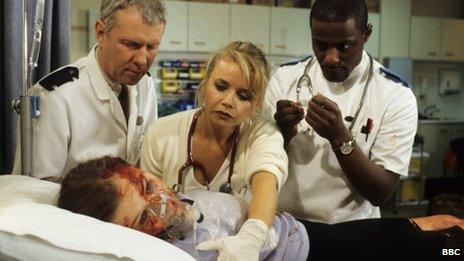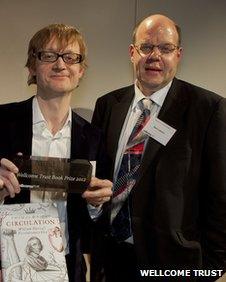Why are medical dramas so popular?
- Published

Feeling squeamish yet? The more blood the better...
Why are we so fascinated by medical dramas? From the high drama of Casualty and ER to the squeamish reality of Embarrassing Bodies and One Born Every Minute, it is hard to look away. Books with a medical or health theme are equally popular on best-selling lists.
When it comes to how our bodies function and malfunction, we are hooked.
Without doubt, medical science is a rich source of stories and intrigue. The popularity of all forms of medical-based drama suggests that we love to watch and read about people dealing with pain and discomfort, facing problems we fear we might face too at some point in our lives.
Prof George Ikkos, president of the Royal Society of Medicine's psychiatry section, says it is more to do with learning about ourselves from other people.
"The integrity of our body is extremely important. We should be concerned about our own body and that lies at the heart of it.
"Programmes like Casualty are dramatic and exciting - they involve a lot of ordinary people we can relate to directly.
"It's not like watching something about nuclear physics or stamp collecting."
Voyeurism
So we have a thirst for knowledge about ourselves and our bodies, and Holby City provides the answer. Or does it?
Prof Ikkos says: "Well-informed programmes can be helpful but people engage at different levels, from the highbrow to the lowbrow, depending on how people relate to what they are watching."
There is, of course, no research to confirm whether these dramas improve our understanding of medical matters or change our perceptions of health issues.
Some fly-on-the-wall medical shows may simply be a popular form of voyeurism.
"But they do give information that is helpful. I would not want to discourage them," Prof Ikkos adds.
The themes of health, medicine and science are also at the heart of many works of popular fiction and non-fiction. Best-selling novels such as Before I Go To Sleep by SJ Watson and Me Before You by Jojo Moyes tackle the subjects of long-term memory loss and life as a paraplegic.
Thomas Wright, whose new book Circulation - a biography of the 17th Century physician William Harvey - won the Wellcome Trust Book Prize this week, external, does not need to be convinced about the power of medical history.
Splattered
He was attracted to the story behind Harvey's discovery that the heart was the principal organ of the body, pumping blood through veins and arteries with an incredible force.
During an experiment, Wright says, Harvey cut the aorta of an animal and the blood dashed out with such force and quantity that it splattered the room.

Thomas Wright receives his award from Mark Lawson
"It was so shocking to people who thought blood flowed sluggishly around the body. It's an image that stayed in my mind."
That dramatic scene opens Wright's book and he returns to it at the end too.
Back then, people did not have much faith in physicians and many did not believe that medicine would be able to help or cure them, if they could afford to go to them in the first place. As a result, Harvey had a tough time convincing people of his theories.
Wright says how we view doctors and their methods has changed greatly since then and that could explain the popularity of medical dramas.
"Now we look to doctors and scientists for answers - we hope that they can overcome illness and death. We put them on a pedestal.
"Just the act of going to a doctor makes me feel better, but that builds expectations and pressure too."
Wright hopes his book will appeal to the same audience who watch the blood-stained medical dramas on TV.
But is it likely that one will translate into the other?
Brooke Magnanti, a judge of the book prize who has a PhD in forensic science and has worked in child health research, says there is every chance that these kinds of books will attract a wider audience.
"It would be lovely if this starts a trend and opens up the world of medical science.
"It's the sort of thing we take for granted. Basic facts about anatomy were a complete mystery just a few hundred years ago and William Harvey was performing experiments to understand more about the human body, very much like modern science today."
The key to its success will surely be if Wright's book is made into a film.
Blood cannot fail to make an impact. Just ask the producers of Casualty.
- Published15 March 2012